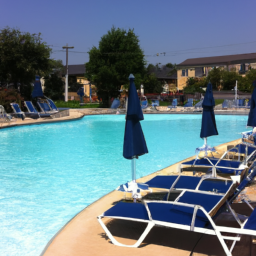Have you ever wondered about the financial implications of owning a timeshare? In this article, we will explore the various costs that come with owning a timeshare, addressing common questions people have on this topic. Whether you are considering purchasing a timeshare or simply curious about the expenses involved, this article will provide you with valuable insights into the financial aspects of timeshare ownership.
Thank you for reading this post, additional resources can be found here, Everything About Timeshares
What Are The Costs Associated With Owning A Timeshare?
If you are considering purchasing a timeshare, it is important to understand the various costs associated with ownership. While owning a timeshare can provide you with a great vacation experience, it is crucial to be aware of the financial commitments involved. In this article, we will explore the different types of costs you can expect when owning a timeshare and provide you with a comprehensive understanding of each.
Upfront Costs
Purchase Price
The purchase price is the initial cost you will incur when buying a timeshare. This price can vary significantly depending on the location, size, and quality of the property. It is important to carefully consider your budget and research the market to ensure you are paying a fair price for your timeshare.
Closing Costs
In addition to the purchase price, you may also be responsible for paying closing costs. These costs cover the administrative expenses associated with transferring ownership of the timeshare. They typically include fees for document preparation, title search, and recording the transfer. It is important to factor these costs into your budget when purchasing a timeshare.
Initial Membership Fee
Some timeshare resorts require owners to pay an initial membership fee. This fee covers the cost of joining the resort’s vacation club or exchange program. It grants you access to additional benefits and services, such as priority booking or discounts on vacation rentals. While the initial membership fee is a one-time expense, it is essential to consider this cost before committing to a timeshare purchase.
Annual Maintenance Fees
Purpose of Maintenance Fees
Annual maintenance fees are one of the most significant ongoing costs associated with owning a timeshare. These fees cover the expenses of maintaining and managing the resort or property. They ensure that the property is well-maintained, amenities are kept in working order, and necessary repairs or upgrades are performed. Maintenance fees contribute to the overall upkeep and quality of your timeshare experience.
Determining Factors
The amount of annual maintenance fees is determined by several factors. These may include the size and location of the timeshare, the number of amenities available, the maintenance requirements of the property, and the overall operating costs of the resort. It is important to review the maintenance fee structure before purchasing a timeshare, as higher fees may indicate a more luxurious and well-maintained property.
Average Annual Maintenance Fees
The average annual maintenance fees for timeshares vary widely, ranging from a few hundred dollars to several thousand dollars. The fees are often due annually or semi-annually, depending on the resort’s policy. While these fees are mandatory, they contribute to the ongoing care and maintenance of the property, ensuring a pleasant vacation experience for all owners.
Special Assessments
Definition of Special Assessments
Special assessments are additional costs that can arise unexpectedly for timeshare owners. These assessments are typically levied when the resort faces unexpected expenses or requires major renovations or repairs. Special assessments are separate from annual maintenance fees and are charged on a per-owner basis to cover the specific expenses incurred.
Reasons for Special Assessments
Special assessments may be necessary for a variety of reasons. These can include major repairs due to natural disasters, renovations to improve the property, or unexpected increases in operating costs. It is important to be aware that special assessments can occur and budget for these potential expenses to avoid any financial surprises.
Impact on Ownership Costs
Special assessments can significantly impact the overall cost of owning a timeshare. These expenses can be substantial, as they are often imposed to cover significant repairs or improvements. It is important to carefully review the resort’s financial history and any potential outstanding assessments before purchasing a timeshare to ensure you are prepared for these additional costs.
Exchange Fees
Explanation of Exchange Fees
Exchange fees are charges incurred when an owner decides to exchange their timeshare for a different location or time period. Timeshare exchange programs allow owners to trade their allocated vacation time for a similar amount of time at a different resort. The exchange fees cover the administrative costs associated with arranging the exchange.
Types of Exchange Programs
There are several types of timeshare exchange programs, each with its own fee structure. Some programs charge a flat fee for each exchange, while others may require an annual membership fee combined with a smaller fee per exchange. It is important to understand the exchange program’s fee structure before participating to ensure it aligns with your budget and vacation preferences.
Costs for Exchanging Timeshares
The costs for exchanging timeshares can vary depending on the exchange program and the specific exchange you are interested in. Fees can range from a few hundred dollars to several thousand dollars, depending on the popularity of the destination, the timing of the exchange, and the demand for that particular resort. It is vital to factor these costs into your overall timeshare budget to determine the true cost of your vacation experiences.
Property Taxes and Insurance
Responsibility for Property Taxes
As a timeshare owner, you are responsible for paying your share of the property taxes associated with the resort. The amount you owe will typically be based on the value and size of your timeshare. Property taxes contribute to the local community and cover expenses such as public services, infrastructure, and amenities.
Importance of Insurance
Insurance is crucial when it comes to protecting your timeshare investment. Timeshare insurance covers damages to the property, liability claims, and unforeseen events such as natural disasters. It is important to thoroughly review your insurance policy to ensure it provides adequate coverage for your specific timeshare needs.
Insurance Premiums
The cost of insurance premiums for timeshares can vary based on several factors. These factors include the location and value of the property, the level of coverage desired, and the insurance company’s rates. It is recommended to obtain quotes from multiple insurance providers to ensure you are obtaining the most comprehensive coverage at a competitive price.
Financing Costs
Interest on Loans
If you finance your timeshare purchase with a loan, you will be responsible for paying interest on that loan. The interest rate will depend on your creditworthiness, the loan term, and the current market rates. It is crucial to compare loan offers from multiple lenders to secure the most favorable interest rate and loan terms.
Loan Application Fees
When applying for a loan to finance your timeshare, some lenders may charge an application fee. This fee covers the administrative costs associated with processing your loan application. It is important to consider these fees when evaluating different loan options and factor them into your overall buying costs.
Loan Servicing Fees
After securing a loan, you may be responsible for paying loan servicing fees. These fees cover the costs of managing and administering your loan, including processing payments, providing account statements, and customer service support. The loan servicing fees are typically included in your monthly mortgage payment and should be considered when determining the overall affordability of your timeshare ownership.
Utility Expenses
Electricity Bills
As a timeshare owner, you will be responsible for paying your portion of the electricity bills associated with your allocated vacation time. The amount you owe will depend on the size of your timeshare and the duration of your stay. It is important to budget for these utility costs to ensure you are prepared for this financial responsibility.
Water and Sewage Charges
In addition to electricity, you may also be responsible for paying your share of water and sewage charges. These costs contribute to the overall upkeep and maintenance of the resort’s water supply and sewage systems. It is essential to factor these expenses into your budget to accurately assess the total cost of owning a timeshare.
Other Utility Costs
While electricity, water, and sewage charges are the most common utility expenses, there may be additional costs associated with owning a timeshare. These can include fees for garbage collection, cable or satellite television, internet access, and other amenities. It is important to review any additional utility costs before purchasing a timeshare to ensure they align with your budget and preferences.
Reservation Fees
Cost for Booking
When booking your timeshare vacation, you may be required to pay a reservation fee. This fee covers the administrative costs associated with processing your reservation, ensuring your desired dates are secured, and providing any necessary support throughout the booking process. Reservation fees can vary but are typically modest compared to other timeshare costs.
Cancellation Fees
In some cases, you may need to cancel or change your timeshare reservation. However, be aware that cancellation or modification fees may apply. These fees compensate the resort for the costs associated with rebooking or reallocating your reserved time. It is important to review the cancellation policy and associated fees before finalizing your reservation to avoid any unexpected charges.
Importance of Reservation Fees
Reservation fees are vital for ensuring the smooth operation of the timeshare resort and efficient processing of guest bookings. These fees help cover the administrative costs associated with managing reservations, enabling the resort to provide a high level of service and support to owners and guests. While reservation fees are a necessary cost, they contribute to a positive vacation experience.
Transfer and Resale Costs
Transfer Fees
If you decide to transfer ownership of your timeshare to another individual, you may be required to pay transfer fees. Transfer fees cover the administrative costs associated with the transfer process, including document preparation, title search, and recording the transfer. It is important to review the transfer fees before initiating any ownership transfers to ensure you understand the financial implications.
Resale Market Expenses
When selling your timeshare on the resale market, there may be additional expenses to consider. These can include advertising and listing fees to market your timeshare. The cost of resale market expenses can vary depending on the platform or agency you choose to use. It is important to factor these expenses into your overall selling costs to accurately assess the potential return on your investment.
Advertising and Listing Fees
To attract potential buyers, it may be necessary to invest in advertising and listing fees to promote your timeshare for resale. These fees cover the costs of marketing your property to a wide audience and increasing its visibility in the competitive resale market. It is important to consider these expenses when planning on selling your timeshare to ensure you can effectively market and sell your ownership interest.
Opportunity Costs
Time Commitment
Alongside the financial costs, there are also opportunity costs associated with owning a timeshare. One of the main opportunity costs is the time commitment required to maximize the value of your timeshare. Using your allocated vacation time and ensuring you make the most of your ownership investment may require careful planning and coordination.
Vacation Flexibility
Owning a timeshare also impacts your vacation flexibility. While timeshares offer the benefit of pre-arranged accommodations at specific resorts, they may limit your options for spontaneous or last-minute trips. It is important to consider how owning a timeshare aligns with your vacation preferences and commitment to a particular location or time period.
Other Investment Opportunities
Another opportunity cost to consider is the potential missed investment opportunities. The upfront costs, annual maintenance fees, and other associated expenses of owning a timeshare could be alternatively invested in other ventures. It is important to evaluate the potential financial returns and benefits of owning a timeshare compared to alternative investment opportunities to ensure you are making the most informed decision.
In conclusion, owning a timeshare comes with various costs that extend beyond the initial purchase price. From annual maintenance fees and special assessments to exchange fees and utility expenses, it is crucial to understand and budget for these costs before committing to a timeshare purchase. Additionally, considerations like property taxes, insurance premiums, financing costs, reservation fees, and transfer and resale costs contribute to the overall financial commitment of timeshare ownership. By understanding the comprehensive costs associated with owning a timeshare, you can make an informed decision and ensure that the financial obligations align with your budget and vacation goals.








